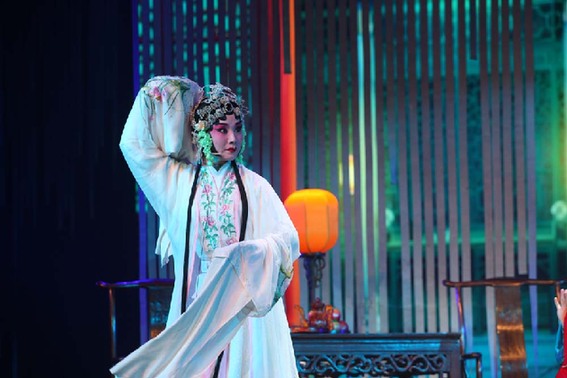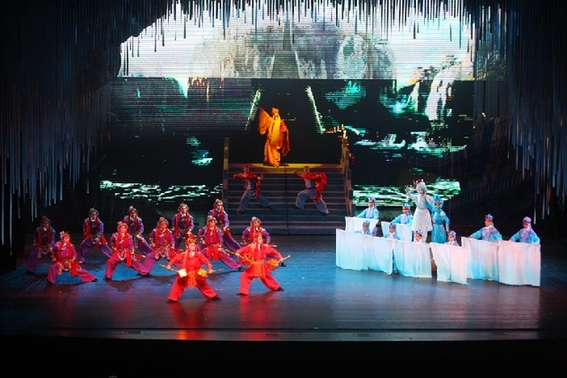Forbidden Love
- By David Ferguson
 0 Comment(s)
0 Comment(s) Print
Print E-mail
China.org.cn, March 17, 2009
E-mail
China.org.cn, March 17, 2009
Lady Blue finally bows to the inevitable, and in order to keep their true nature secret, the ladies pretend to be the spirits of birds and fish. Lady White and Xu Xian are married. They run a herbal medicine shop, which is a great success thanks to Lady White's expertise in herbs and her generous nature.
But the relationship has come to the attention of Fa Hai (Li Dewang), a powerful monk who is scandalized by the idea. At the Dragon Boat Festival he forces Xu Xian to ply Lady White with wine. Trusting to her love, she finally accedes, knowing that a draught of the wine will cause her to reveal her true snake form to her husband, who lets the side down a little by promptly dying of fright.
 |
|
Lady White warns her husband of the consequences if she drinks the wine – but when did a man ever listen? [Hongyu Zhu] |
Lady White goes on a quest to the sacred mountain, where she exchanges her immortality for a mushroom that will bring her husband back to life. But the bond between the couple has been broken, and Xu Xian soon flees to take refuge in Fa Hai's temple.
Lady White and Lady Blue head off once more to recover the errant accountant, and their Water Spirits do battle with Heaven's soldiers, only to fail. They return, defeated to West Lake, but Xu Xian has been touched by his wife's courage and devotion. He follows the sisters, and the couple are reunited.
But Fa Hai is not finished. He too has pursued the trio. This time he captures Lady White in a magic alms bowl, and imprisons her in the rock below his temple. Xu Xian follows his lost love once more, and the opera concludes as they sing to each other, he on the face of the rock and she trapped beneath it.
The Opera's arias are interspersed with a whole series of dance, acrobatics, and martial arts. Tiny girls juggle umbrellas, and also produce a stunning display of diablo throwing where you find yourself praying that no-one is going to miss. One young man performs an accelerating series of back flips so long that I lost count – truly a "How does he do that?" moment. The dances feature traditional Chinese symbols such as cranes and water lilies. Scene settings are generally splendid, particularly those for the wedding feast, for the herbal shop, and for the sacred mountain.
But the highlight of the opera for me was the battle scene at Fa Hai's temple. This is the act where music, song – individual aria and choruses – choreography, martial arts, acrobatics and special visual effects all blend together at their best in a dramatic crescendo.
|
The dramatic battle scene at Fa Hai's temple – Water Spirits v. Heaven's Soldiers. [Hongyu Zhu] |
Lady White and Xu Xian are the leads, and both produce a superb display. I found Su Xu's voice a little light to begin with, and wondered if he was not suffering from one of Beijing's ubiquitous coughs. But he warned to his task, and perhaps it is an artistic device, the strengthening voice being a sign of the growing confidence of the simple accountant as he succeeds in capturing such a trophy for his love.
Fa Hai is a mighty character, and Li Dewang does the role full justice, equally powerful in voice and in presence.
Lady Blue was my favorite. She has a greater range of emotions to express than Lady White, and is perhaps more fun to perform. Liu Yuanyuan gave a sterling performance – her singing was wonderful, her expressions – outrage at her sister's forbidden love, anger at the perfidy of Xu Xian, aggression in the fight with Fa Hai – suitably dramatic, and she showed her versatility by playing the central role in a spectacular group juggling session – part of a battle scene – where she kicked spears around with a deftness of touch that would have done credit to Cristiano Ronaldo.
I am not enough of a connoisseur to judge the show on its operatic merits alone – some purists may find it not quite highbrow enough for their tastes. But I can say quite categorically that along with my wife, who is Chinese, and my son, who is four, I had a wonderful evening's entertainment that I would not hesitate to recommend to anyone in search of something a little out of the ordinary. The whole team – cast and production – under overall Director Cao Xiaoning, deserve great credit.

Go to Forum >>0 Comment(s)